To find reliable NYC contractors, start by using NYSERDA-approved contractors known for energy efficiency. Gather recommendations from friends and check online reviews. Research each contractor's credentials, ensuring they're licensed and insured. Interview at least three candidates to compare their expertise and communication styles. Request detailed, written estimates to understand costs clearly. Verify their insurance and financial stability to avoid issues later. Understand the contract scope, including timelines and payment schedules. Lastly, consider design-build options for a smoother project. These tips will help you make informed decisions, and there's more valuable advice just ahead.
Utilize NYSERDA-Approved Contractors
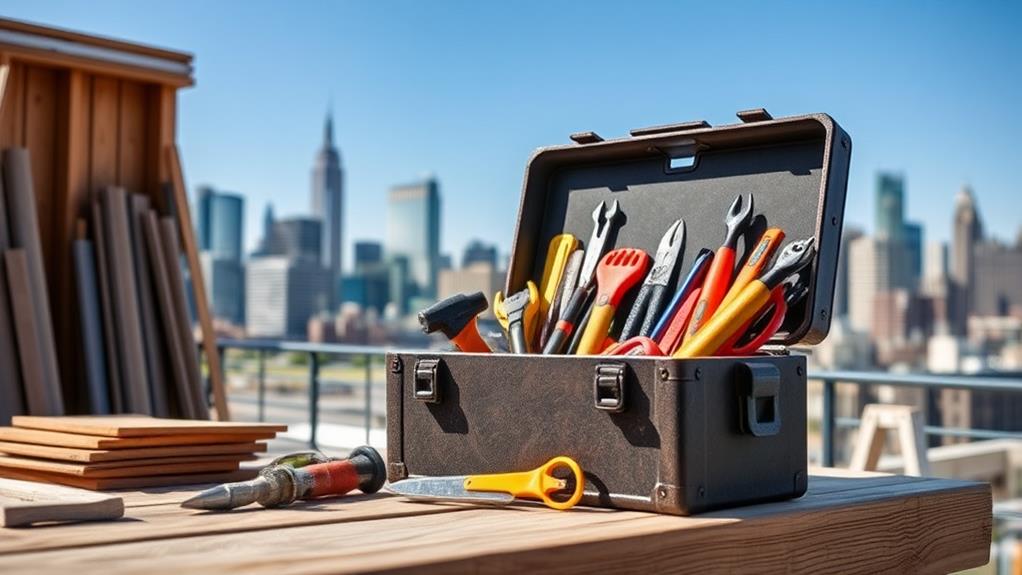
When you're looking to enhance your home's energy efficiency, utilizing NYSERDA-approved contractors is a smart move. These contractors are trained and certified, ensuring they specialize in energy efficiency services. This means you can trust their expertise during your home renovation project.
Notably, Commercial Contractor New York is known for its commitment to sustainability and innovative solutions, which can further enhance your renovation experience. NYSERDA-approved contractors include categories like home energy performance contractors, clean heating and cooling contractors, and renewable energy contractors, offering tailored solutions to meet your specific needs.
By hiring a reliable general contractor from this list, you increase the reliability and effectiveness of your renovation. Homeowners can easily access a comprehensive list of NYSERDA-approved contractors, streamlining the selection process to find the right fit for their project.
Moreover, these contractors not only focus on high-quality work but also may provide access to incentives and programs that support energy efficiency upgrades. This can ultimately help reduce renovation costs.
Gather Recommendations From Trusted Sources
Finding the right contractor isn't just about credentials; it's also about personal experiences. Start by asking friends, family, and coworkers who've recently completed similar home projects for recommendations. Their firsthand experiences with general contractors in New York can provide valuable insights into reliable contractors.
Additionally, consider how a commercial contractor's role in urban transformation can influence the quality of work and innovation in your project.
Next, utilize trusted online platforms like Houzz and Yelp. These sites allow you to read contractor ratings and reviews from past clients, helping you assess their reliability and quality of work.
Don't overlook local community forums and social media groups where residents share their experiences and recommend contractors based on their work in NYC. These platforms can offer a wealth of local knowledge.
Additionally, consult real estate agents or hardware store staff, as they often have industry insights and can provide referrals to reputable contractors.
Lastly, check the Department of Buildings for contractor permit history and job volume. This ensures that the recommended contractors have a solid track record in the area, giving you peace of mind as you embark on your project.
Gathering recommendations from trusted sources is a crucial step in finding the right contractor for your needs.
Research Contractor Credentials Thoroughly
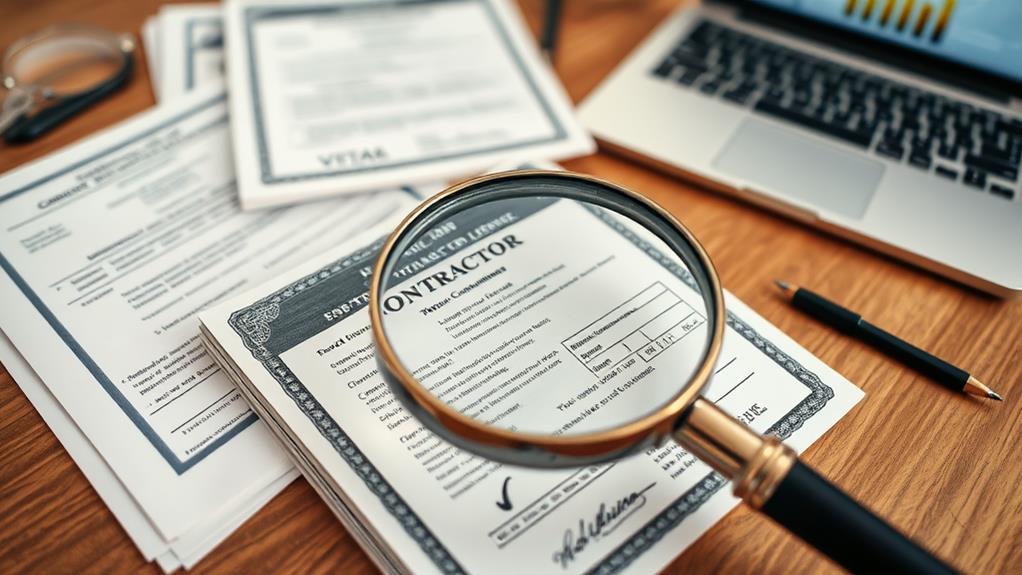
Thoroughly researching contractor credentials is crucial to ensuring a successful home project. When you hire contractors in New York, you want to make sure they've the right qualifications and experience.
A reputable contractor, such as a commercial contractor in NYC, will specialize in navigating the unique challenges of the urban construction environment. Here are some key steps to follow:
- Verify licenses issued by the NYC Department of Buildings (DOB) and Department of Consumer Affairs (DCA).
- Ensure they've adequate general liability and workers' compensation insurance to protect you from financial risks.
- Investigate their past projects and customer feedback on platforms like Houzz and Yelp.
- Reach out to at least two past clients to ask about their satisfaction with the contractor's work quality and communication.
- Check the contractor's permit history and job volume with the Department of Buildings to gauge reliability.
Interview Multiple Candidates
As you move forward with your project, interviewing multiple contractors can significantly enhance your chances of finding the right fit. Start by meeting at least three contractors to compare their approaches, expertise, and communication styles. This process helps you understand what each contractor brings to the table.
During the interviews, ask about their specific experience with similar projects. This will give you insight into their understanding of unique challenges and requirements. Additionally, inquire about their project management techniques and timelines. A good contractor should have a clear process for keeping the project on track and providing updates along the way.
Don't forget to request references from previous clients during the interviews. Hearing about others' experiences can reveal a contractor's reliability, work quality, and ability to meet deadlines.
Lastly, discuss pricing structures and request itemized estimates. This helps you understand how each contractor values their services and identify any significant price discrepancies.
Request Detailed Written Estimates
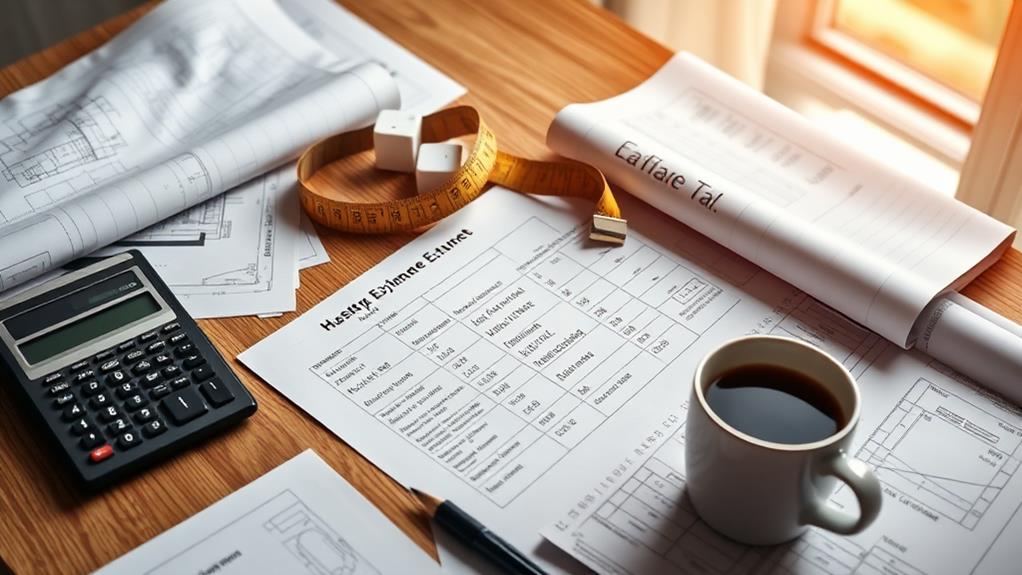
Requesting detailed written estimates from contractors is essential for making informed decisions about your project. When you ask for these estimates, you gain a clear breakdown of materials, labor, and expenses, which helps you compare bids effectively.
To ensure you get the best information, provide each contractor with the same project specifications. This way, you can spot discrepancies and understand pricing differences more easily.
Here are some key points to consider when requesting estimates:
- Ensure estimates are itemized, showing costs for each project component.
- Look for timely responses, as they often indicate a contractor's reliability and professionalism.
- Ask for explanations if you notice significant price differences; this can reveal variations in quality or hidden costs.
- Use the estimates to identify areas where you might cut costs or adjust the project's scope if needed.
- Keep in mind that vague or delayed estimates might signal potential issues.
Check References and Past Work
Checking references and past work is crucial for ensuring you've chosen a reliable contractor. Start by contacting at least two past clients to gather feedback on their satisfaction with the contractor's work quality, timeliness, and communication. This firsthand insight can reveal a lot about what you can expect.
Next, request to see a portfolio of completed projects similar to yours. This will help you assess the contractor's experience and the quality of their workmanship.
Don't forget to check online reviews and ratings on platforms like Houzz and Yelp. These reviews can provide additional insights into the contractor's reputation and past performance. Speaking with subcontractors or suppliers who've worked with the contractor is also beneficial; they can offer perspectives on reliability, payment practices, and overall business health.
Lastly, use the Department of Buildings to verify the contractor's permit history and job volume. This ensures they've a solid track record in the industry.
Assess Communication Styles and Responsiveness

Once you've evaluated references and past work, it's time to focus on communication styles and responsiveness. Effective communication is essential for a successful contractor-client relationship. You want a contractor who understands your project expectations and keeps you updated throughout the process.
To assess a contractor's responsiveness, consider these key points:
- Response Time: A reliable contractor should return your calls or emails within 24 hours.
- Regular Updates: Expect updates on project status to foster transparency and trust.
- Communication Style: Evaluate if their style aligns with yours for better collaboration.
- Clarity on Changes: Ensure clear discussions about project changes and costs to avoid conflicts.
- Open Dialogue: Look for a contractor who encourages questions and discussions, enhancing overall communication.
Verify Insurance and Financial Stability
It's crucial to verify that contractors have the right insurance and financial stability before hiring them. Always ensure that a general contractor carries general liability and workers' compensation insurance. This protects you from potential financial liabilities that may arise from accidents or damages during the project.
Make sure their coverage limits are adequate—at least $1 million for general liability and $500,000 for workers' compensation, depending on the project's size.
Request a certificate of insurance directly from the contractor's insurance provider. This verifies that their policies are current and effective for the duration of your project.
Next, assess the contractor's financial stability. You can do this by requesting references and checking their payment history with suppliers and subcontractors. A reliable contractor should demonstrate a solid ability to manage project costs.
Additionally, use local resources to verify the contractor's license status. Look for any complaints or violations, as a good reputation often reflects overall reliability and financial health.
Understand the Contract Scope
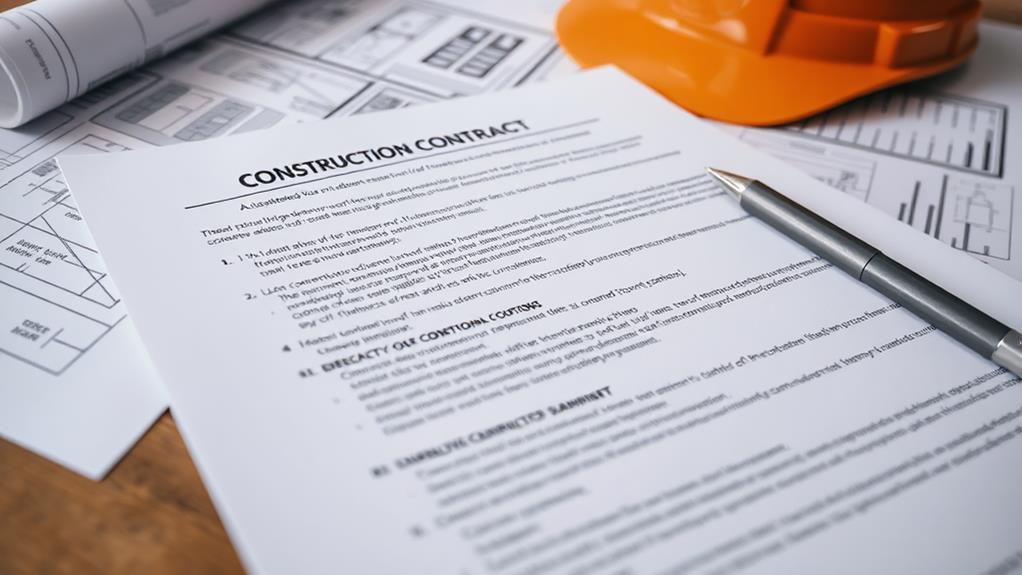
Understanding the contract scope is essential for a successful renovation project. When you find the right contractor, you need to ensure that everyone is on the same page about what the project entails.
A well-defined project scope helps avoid misunderstandings and keeps expectations clear. Here are some key elements to include in your contract:
- Detailed descriptions of tasks and materials
- Timelines for project completion and key milestones
- Payment schedules outlining when and how much to pay
- Contingencies for unexpected issues that might arise
- A clear process for handling changes to the project scope
Consider Design-Build Options for Efficiency
When you're planning a renovation, considering design-build options can significantly enhance your project's efficiency.
Design-build contractors offer an integrated approach that combines both design and construction services. This means you'll have efficient communication throughout the renovation process, which helps reduce miscommunications. Instead of juggling multiple contracts, homeowners work directly with one entity, streamlining project management.
This model allows the design and construction phases to overlap, leading to quicker project timelines. Faster decision-making and implementation mean you can see your vision come to life sooner.
Plus, a design-build team collaborates closely to ensure that your aesthetic and functional goals align from the start, creating a unified vision for your project.
Engaging a design-build contractor can also lead to cost savings. Because the process is streamlined, there are often fewer change orders, and you'll receive a more accurate budget estimate upfront.
This can help you avoid unexpected expenses and keep your project on track. Overall, by choosing design-build options, you're setting yourself up for a smoother, more efficient renovation experience.
Conclusion
In conclusion, finding reliable NYC contractors doesn't have to feel like a reality show challenge. By sticking to these tips, you can dodge the drama and avoid the dreaded "surprise" costs. Remember to verify credentials, gather recommendations, and always read the fine print—your wallet will thank you later. With a little effort, you can turn your home improvement dreams into reality, rather than a cautionary tale told around the water cooler. Happy contracting!

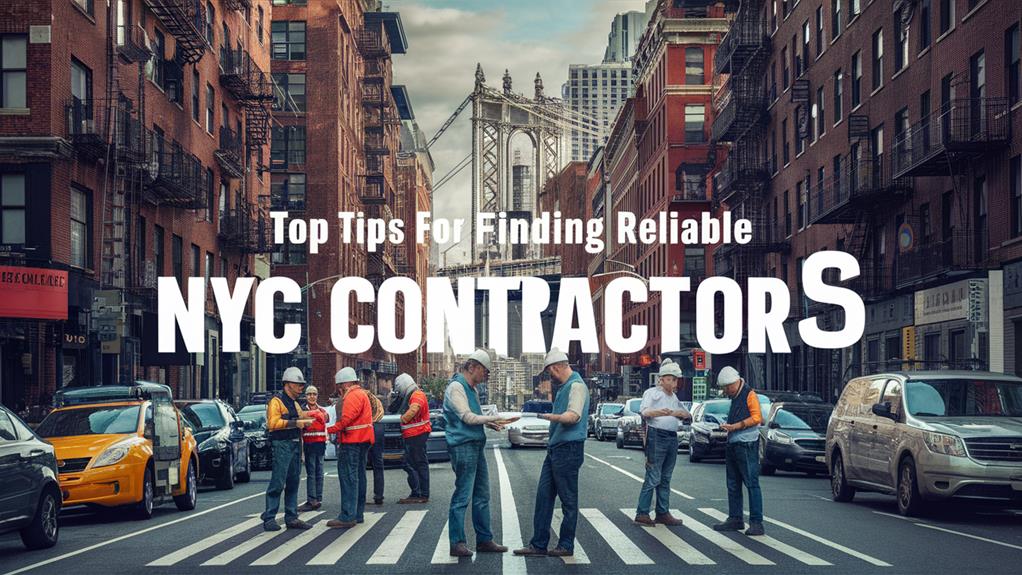
Leave a Reply